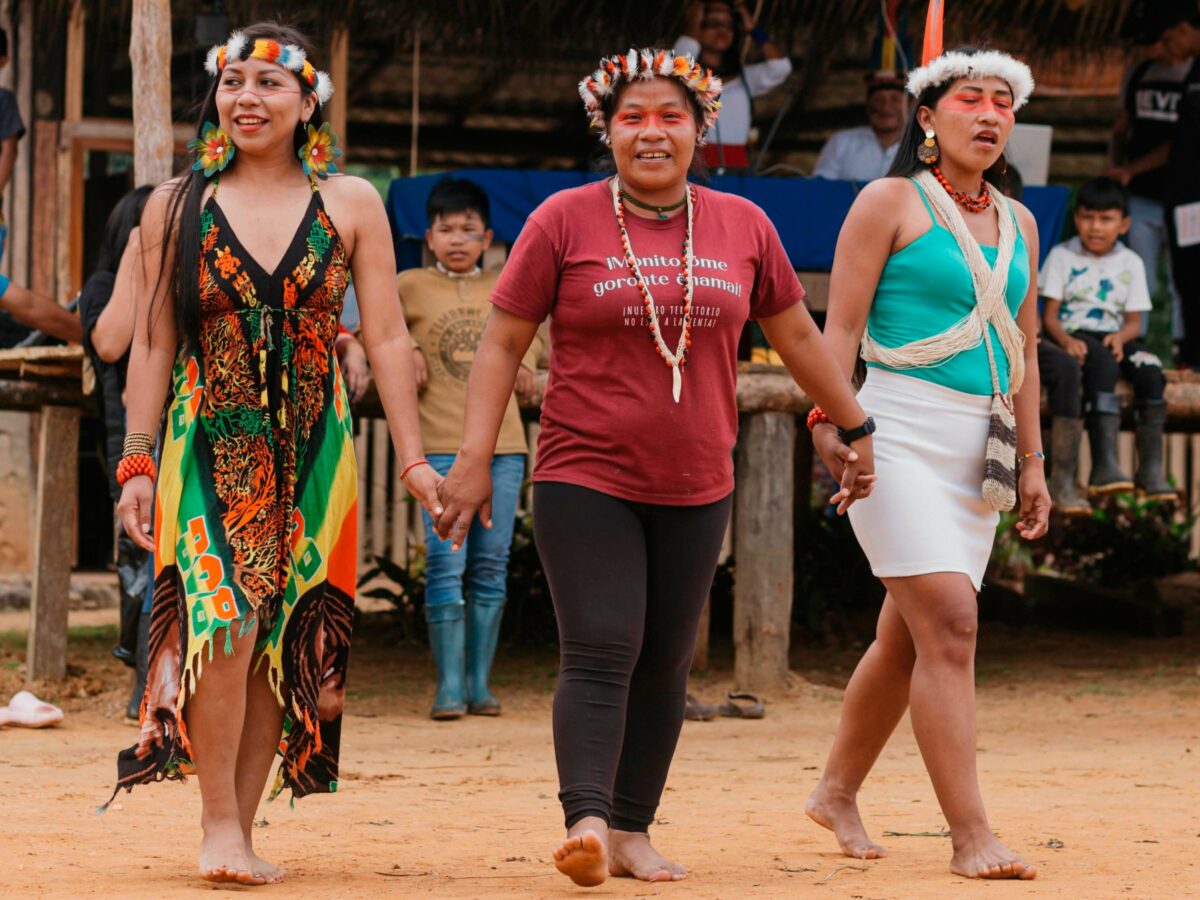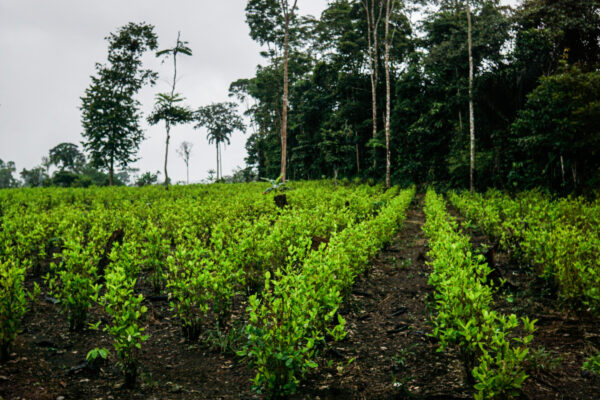Okay, I have to admit it. With 2022 in the rearview mirror and the new year underway, I’m getting reacquainted with a long-lost feeling: optimism. And not just because of climate icon Greta’s eviscerating of a misogynist on Twitter. While we can’t ignore the continued threats to democracy in Amazonian countries (most recently on display by Bolsonaristas storming Brazil’s presidential palace), a series of advances at the end of 2022 and the first week of January have created a real reason to be hopeful about efforts to combat climate change, protect the Amazon, and respect Indigenous rights – especially in our campaign to End Amazon Crude.
There are several reasons to be optimistic about building momentum to further restrict plans to expand oil extraction in the Amazon and keep fossil fuels permanently in the ground, and Ecuador is a great example. A recent court decision revived a case brought eight years ago that would force a national vote on whether to maintain the country’s largest fossil fuel reserves underneath a part of Yasuní National Park, a world biosphere reserve and widely known to be one of the most biodiverse places on Earth. It is also home to the Tagaeri and Taromenane, two Indigenous peoples living in voluntary isolation.
The case awaits a procedural decision from the Constitutional Court but will likely be on the ballot in the fall of 2023. When the case was first filed, drilling of the ITT (Ispingo, Tambococha, Tiputini) oil fields had yet to begin. But production is now underway at over 150 wells, with at least 400 more planned. A referendum vote in favor of keeping the ITT fields in the ground would restrict drilling, road building, and flaring at hundreds of new wells in the most remote part of Yasuní National Park.
Additionally, a decision is expected in 2023 in another case now before the Inter-American Court of Human Rights on the impact of drilling and other extractive activities on the Tagaeri-Taromenane, and the government’s failure to guarantee their rights as isolated peoples. A favorable decision would recognize their territorial rights – a first for isolated peoples – and could redraw the boundaries of a current “no-go zone,” effectively restricting drilling activity in seven oil blocks that overlap Yasuní National Park. These opportunities reflect years of work by Indigenous communities.
Indigenous rights rising
The critical role that Indigenous peoples play in protecting the world’s ecosystems and biodiversity is at long last being recognized. Following successful advocacy work at COP15 this past December in Montreal, global leaders acknowledged that a rights-based approach that recognizes and respects Indigenous land tenure, autonomy, and consent is an essential part of any successful conservation effort and climate change mitigation strategy.
Policymakers are finally responding to the demands of our movement and waking up to the fact that Indigenous peoples are the most effective stewards of the environment, and that their traditional knowledge and sustainable land management practices are behind the statistic that they protect roughly 80% of the world’s biodiversity while making up only 6% of the population.
In fact, the Global Biodiversity Framework agreed upon by 180 nations at COP15, which agreed to protect 30% of land and oceans by 2030, included important language on Indigenous rights. While this is not enough in ambition, implementation, and enforceability, it goes further than any other agreement of its kind and makes explicit reference to rights, which was noticeably absent from the previous 2010 targets. These global commitments set the stage, making 2023 a prime year for centering Indigenous rights and taking on the oil industry in our campaigns.
Banks bail on Amazon crude
In response to the research, campaign pressure, and dialogue with Indigenous organizations, Amazon Watch, and Stand.earth that took place in 2021, six top EU banks have halted the financing of trade of crude oil sourced from the Ecuadorian Amazon, and the fallout continues, as Ecuador’s state-run oil company Petroecuador is facing increased financial and corruption struggles. The banks collectively represent 85% of the financing for the trade of Amazon crude from Ecuador, which is roughly $10 billion over the last decade.
Our financing campaigning strategies and the banks’ subsequent exclusions forced Petroecuador, the country’s state-run oil company responsible for 80% of crude production, to take unprecedented measures to get its toxic commodity to market. In a statement, Petroecuador conceded that “[Measures were] taken because of the difficulty in obtaining letters of credit from some international entities as a result of restrictions on the sale of crude extracted from the Ecuadorian Amazon.”
The net impact is that it has made it much harder for companies looking to trade Ecuadorian oil to obtain letters of credit/financing to do so, and therefore has created financial barriers that obstruct Petroecuador’s plans to expand extraction and new exploration. In May of 2022, BNP Paribas went further than just ending financing of the trade of Amazon crude from Ecuador. The French bank committed to no longer finance oil and gas projects, along with associated infrastructure, across the entire Amazon biome, and cut financing to any company involved in production based on Amazon oil and gas reserves.
Doubling oil production deterred in Ecuador
Ecuador’s President Guillermo Lasso made doubling oil production and opening up primary rainforest for new exploration on Indigenous lands a hallmark of his administration upon his election in 2021. But the strategies to restrict financing for the trade of Ecuadorian oil, combined with on-the-ground organizing, protests, and legal action by Indigenous peoples in Ecuador have deterred Lasso’s plans.
A three-week strike in June 2022 by Ecuador’s national Indigenous confederation CONAIE shut down the country over cost of living increases and unfettered oil and mining extraction. The protests forced the revocation of Decree 95 which enabled the pro-industry policy reforms. And the subsequent dialogue between the Indigenous movement and the government led to a temporary moratorium on all new oil and mining concessions, for at least a year until a law on Free, Prior, and Informed Consent of Indigenous peoples is adopted.
Meanwhile, entrenched corruption in the industry and government ministries – which has led to five presidents in four years at Petroecuador with dozens facing charges, and the removal of two Lasso-appointed energy ministers – has eroded what little investor confidence remained.
But while we are living in the twilight of the fossil fuel industry, it is not going down without a fight. It was a year of record revenue for oil and gas companies, and they’re using the windfall profits to invest in new expansion, hoping to lock in projects well beyond future demand.
According to a carbon tracker report analyzing financial data from 2021/Q1 2022, oil majors approved some $58 billion in investment for new projects that are only needed if demand increases, but which would push temperatures beyond an increase of 2.5°C. Despite Paris commitments, many countries are planning to increase fossil fuels more than is consistent with 1.5°C scenarios. And, the finance sector continues to be the fossil fuel industry’s enabler. Sixty banks provided $185 billion to the 100 companies working to expand fossil fuels.
So there is still plenty that we are prepared to work on and campaign against. The effects of climate change are here sooner and with greater force than predicted. But between bottom-up strategies in Indigenous territories, legal action, and finance and market strategies, 2023 is full of opportunities to keep fossil fuels in the ground, strengthen Indigenous rights, and make strides in creating a climate-safe world by protecting the Amazon. Join us!













